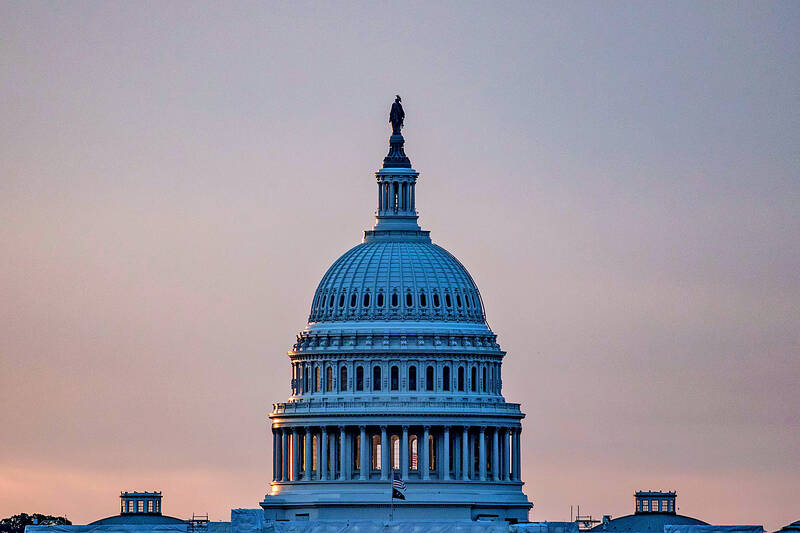The reviews are starting to come in as details emerge about the debt ceiling agreement reached by US President Joe Biden and US House of Representatives Speaker Kevin McCarthy.
Even before seeing those details, some lawmakers were criticizing the deal as not doing enough to tackle the nation’s debt, while others worried it is too austere and would harm many low-income Americans.
The legislation would probably need support from a significant number of lawmakers from both parties to clear the closely divided House and gain the 60 votes necessary to advance in the US Senate.

Photo: AFP
Many lawmakers said they were withholding judgement until they see the final details, many of which did not come out until Sunday evening. That is when the 99-page bill that resulted from the Biden-McCarthy negotiations was made public.
Some of the earliest objections are coming from the most conservative members of the US Congress, particularly members of the hardline House Freedom Caucus that often clashes with Republican leadership.
“I think it’s a disaster!” Republican US Representative Matt Rosendale wrote on Twitter.
“Fake conservatives agree to fake spending cuts,” Republican US Senator Rand Paul wrote.
“This ‘deal’ is insanity,” Republican US Representative Ralph Norman posted. “A $4T debt ceiling increase with virtually no cuts is not what we agreed to. Not gonna vote to bankrupt our country. The American people deserve better.”
Republican leaders knew all along that they would lose some members’ support in any compromise with a Democratic-led White House and Senate. The question has always been whether the deal would pick up enough Democratic support to offset those defections.
As much as some Democrats dislike what is roughly a spending freeze on non-defense programs next year and chafe at work requirements being extended to more food stamp recipients, initial reaction has been circumspect as they await more details.
US Representative Annie Kuster and chair of a group known as the New Dems, which has roughly 100 members, said the group is “confident” that White House negotiators delivered a “viable, bipartisan solution to end this crisis.”
Democratic US Senator Chris Coons said he believed it was the best deal that could be reached given the demands coming from House Republicans.
“To my colleagues who have serious misgivings about this deal, I say this is far better than defaulting,” Coons said.
The likeliest opposition would come from the more liberal members of the caucus. Democratic US Representative Pramila Jayapal has been voicing opposition to additional work requirements for some of those getting food and cash assistance.
She called it “terrible policy” on CNN’s State of the Union on Sunday.
The Business Roundtable, a group of more than 200 chief executive officers, called on Congress to pass the bill as soon as possible.
“In addition to raising the debt ceiling, this agreement takes steps toward putting the US on a more sustainable fiscal trajectory,” group CEO Joshua Bolten said. “This deal also makes a down payment on permitting reform, helping to clear the path for new energy infrastructure projects.”

The death of a former head of China’s one-child policy has been met not by tributes, but by castigation of the abandoned policy on social media this week. State media praised Peng Peiyun (彭珮雲), former head of China’s National Family Planning Commission from 1988 to 1998, as “an outstanding leader” in her work related to women and children. The reaction on Chinese social media to Peng’s death in Beijing on Sunday, just shy of her 96th birthday, was less positive. “Those children who were lost, naked, are waiting for you over there” in the afterlife, one person posted on China’s Sina Weibo platform. China’s

‘POLITICAL LOYALTY’: The move breaks with decades of precedent among US administrations, which have tended to leave career ambassadors in their posts US President Donald Trump’s administration has ordered dozens of US ambassadors to step down, people familiar with the matter said, a precedent-breaking recall that would leave embassies abroad without US Senate-confirmed leadership. The envoys, career diplomats who were almost all named to their jobs under former US president Joe Biden, were told over the phone in the past few days they needed to depart in the next few weeks, the people said. They would not be fired, but finding new roles would be a challenge given that many are far along in their careers and opportunities for senior diplomats can

Australian Prime Minister Anthony Albanese yesterday announced plans for a national bravery award to recognize civilians and first responders who confronted “the worst of evil” during an anti-Semitic terror attack that left 15 dead and has cast a heavy shadow over the nation’s holiday season. Albanese said he plans to establish a special honors system for those who placed themselves in harm’s way to help during the attack on a beachside Hanukkah celebration, like Ahmed al-Ahmed, a Syrian-Australian Muslim who disarmed one of the assailants before being wounded himself. Sajid Akram, who was killed by police during the Dec. 14 attack, and

RUSHED: The US pushed for the October deal to be ready for a ceremony with Trump, but sometimes it takes time to create an agreement that can hold, a Thai official said Defense officials from Thailand and Cambodia are to meet tomorrow to discuss the possibility of resuming a ceasefire between the two countries, Thailand’s top diplomat said yesterday, as border fighting entered a third week. A ceasefire agreement in October was rushed to ensure it could be witnessed by US President Donald Trump and lacked sufficient details to ensure the deal to end the armed conflict would hold, Thai Minister of Foreign Affairs Sihasak Phuangketkeow said after an ASEAN foreign ministers’ meeting in Kuala Lumpur. The two countries agreed to hold talks using their General Border Committee, an established bilateral mechanism, with Thailand